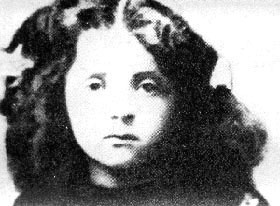Golda Meir
Golda Meir (born Golda Mabovitch; May 3, 1898 – December 8, 1978) was an Israeli stateswoman, politician, teacher, and kibbutznik who served as the fourth Prime Minister of Israel. Meir was Israel's first and the world's third woman to hold such an office, and she has been described as the "Iron Lady" of Israeli politics, predating the term's association with British Prime Minister Margaret Thatcher. Born in Kiev in the Russian Empire (now Ukraine), she emigrated to the United States as a child with her family in 1906, before moving to Mandatory Palestine in 1921 with her husband, Morris Meyerson.
Early Life[edit | edit source]
Golda Meir was born on May 3, 1898, in Kiev, Russian Empire, and moved to Milwaukee, Wisconsin, in 1906. Showing early signs of leadership, she organized the American Young Sisters Society at her school to raise money for her classmates' textbooks. Meir graduated as valedictorian of her class despite the challenges she faced as an immigrant.
Political Career[edit | edit source]
Meir's political career began in the Labor Zionist movement, where she held several key positions before Israel's independence. She was a signatory of the Declaration of the Establishment of the State of Israel on May 14, 1948, and soon after served as the Israeli ambassador to the Soviet Union.
As a member of the Mapai party, she held various ministerial roles, including Minister of Labour and Foreign Minister under Prime Minister David Ben-Gurion. Meir was known for her straightforwardness and her commitment to the Israeli state and its people.
In 1969, following the death of Prime Minister Levi Eshkol, Meir came out of retirement to lead the country, becoming Prime Minister during a tumultuous time in Israeli history. Her tenure included the lead-up to and aftermath of the Yom Kippur War of 1973, a conflict that tested Israel's strength and resilience.
Legacy[edit | edit source]
Golda Meir's legacy is marked by her tireless dedication to the State of Israel and her role as a pioneer for women in global politics. Despite controversies over her handling of the Yom Kippur War, Meir is remembered for her leadership qualities, her iron will, and her contributions to the establishment and security of the State of Israel.
Death[edit | edit source]
Golda Meir passed away on December 8, 1978, from lymphoma. Her passing was mourned by many across the world, and she is remembered as one of the most influential figures in Israeli history.
Transform your life with W8MD's budget GLP1 injections from $125 and up biweekly
W8MD offers a medical weight loss program NYC and a clinic to lose weight in Philadelphia. Our W8MD's physician supervised medical weight loss centers in NYC provides expert medical guidance, and offers telemedicine options for convenience.
Why choose W8MD?
- Comprehensive care with FDA-approved weight loss medications including:
- loss injections in NYC both generic and brand names:
- weight loss medications including Phentermine, Qsymia, Contrave, Diethylpropion etc.
- Accept most insurances for visits or discounted self pay cost.
- Generic weight loss injections starting from just $125.00 for the starting dose
- In person weight loss NYC and telemedicine medical weight loss options in New York city available
Book Your Appointment
Start your NYC weight loss journey today at our NYC medical weight loss, and Philadelphia and visit Philadelphia medical weight loss Call (718)946-5500 for NY and 215 676 2334 for PA
Search WikiMD
Ad.Tired of being Overweight? Try W8MD's NYC physician weight loss.
Semaglutide (Ozempic / Wegovy and Tirzepatide (Mounjaro / Zepbound) available. Call 718 946 5500.
Advertise on WikiMD
|
WikiMD's Wellness Encyclopedia |
| Let Food Be Thy Medicine Medicine Thy Food - Hippocrates |
Translate this page: - East Asian
中文,
日本,
한국어,
South Asian
हिन्दी,
தமிழ்,
తెలుగు,
Urdu,
ಕನ್ನಡ,
Southeast Asian
Indonesian,
Vietnamese,
Thai,
မြန်မာဘာသာ,
বাংলা
European
español,
Deutsch,
français,
Greek,
português do Brasil,
polski,
română,
русский,
Nederlands,
norsk,
svenska,
suomi,
Italian
Middle Eastern & African
عربى,
Turkish,
Persian,
Hebrew,
Afrikaans,
isiZulu,
Kiswahili,
Other
Bulgarian,
Hungarian,
Czech,
Swedish,
മലയാളം,
मराठी,
ਪੰਜਾਬੀ,
ગુજરાતી,
Portuguese,
Ukrainian
Medical Disclaimer: WikiMD is not a substitute for professional medical advice. The information on WikiMD is provided as an information resource only, may be incorrect, outdated or misleading, and is not to be used or relied on for any diagnostic or treatment purposes. Please consult your health care provider before making any healthcare decisions or for guidance about a specific medical condition. WikiMD expressly disclaims responsibility, and shall have no liability, for any damages, loss, injury, or liability whatsoever suffered as a result of your reliance on the information contained in this site. By visiting this site you agree to the foregoing terms and conditions, which may from time to time be changed or supplemented by WikiMD. If you do not agree to the foregoing terms and conditions, you should not enter or use this site. See full disclaimer.
Credits:Most images are courtesy of Wikimedia commons, and templates, categories Wikipedia, licensed under CC BY SA or similar.
Contributors: Prab R. Tumpati, MD







